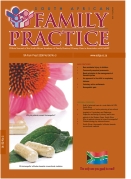Teledermatology by Videoconference : Experience of a Pilot Project
Keywords:
teledermatology
Abstract
Background: There is a shortage of medical specialists within the provincial departments of health in South Africa. Telemedicine is a potential way of providing specialist services, at a distance, to rural areas. This study assesses patient and staff satisfaction and issues, technological and operational, associated with the establishment of a videoconference-based teledermatology service. Methods: An ISDN-based videoconference link was established between Port Shepstone Hospital and the Nelson R Mandela School of Medicine in Durban. Patients with a dermatological problem that would have necessitated transfer to the academic hospital for diagnosis and/or management were entered into a prospective study which evaluated the ability to make a diagnosis and prescribe a management plan by videoconference and the patients’ and doctors’ satisfaction with the consultations. Results: A total of 69 patients were seen during 12 videoconferenced consultation sessions. Seventeen patients (24.6%) were subsequently referred to the academic hospital: nine patients were sent because a definitive diagnosis could not be made; and eight patients were transferred for specialist management based on the diagnosis made. The patients’ and referring doctors’ satisfaction with the consultation was 80.3% and 82.1% respectively, while the dermatologist was satisfied 67.6% of the time. The dermatologist was dissatisfied with ten (14.7%) of the consultations and this was related to difficulties in making a definitive diagnosis. The referring doctors found 59 (85.9%) of the consultations to be of educational value. No problems were noted in diagnosing lesions in dark-skinned patients. Conclusion: Videoconferenced teledermatology between district hospitals and regional hospitals is possible and can improve services to rural areas. Further studies on widespread implementation and sustainability are warranted.
Published
2008-03-26
Section
Original Research
By submitting manuscripts to SAFP, authors of original articles are assigning copyright to the South African Academy of Family Physicians. Copyright of review articles are assigned to the Publisher, Medpharm Publications (Pty) Ltd, unless otherwise specified. Authors may use their own work after publication without written permission, provided they acknowledge the original source. Individuals and academic institutions may freely copy and distribute articles published in SAFP for educational and research purposes without obtaining permission.

